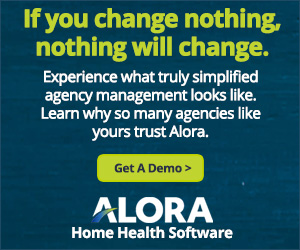
21 Aug Website SEO Tips for Home Health Care Agencies
The top 6 tips for improving your homecare business website
In the competitive world of online search, home health businesses may not have a large budget to hire a professional SEO firm to boost ranking into the top positions on the keyword searches that matter most. That said, there are a number of things you can do on your website and online to help your agency’s website rank higher, attract more eyes, and show up in more relevant searches that will attract new patients. Let’s get into the top six things you can do NOW to make your home health care agency more likely to stand out in online searches.
#1. Optimize your website for local search terms.
Getting an easy-to-edit website is not as costly or as time-consuming as it used to be. Between WordPress, and a number of website companies that are template-based, if you can type basic text, you can add content and optimize your website even without a dedicated web marketer. Use Google Search to use any number of free online keyword finders and measurement tools (Google Analytics, WordStream, Google Keyword Planner).
Utilize the top cities and counties where your agency serves patients and add those areas to the top search terms for the home health care services you provide. For example, if your agency is in Tampa Florida, you’ll want to write short paragraphs, bullets, etc. that contain the keyword and the city, county:
Tampa Florida Home Health Agency – Tampa Home Health Agency – Homecare in Tampa – Affordable Homecare Agency in Tampa – Best non-skilled care in Tampa – Medicare Certified Agencies in Tampa
#2. Use ChatGPT & AI as a content “Helper” not a Content Writer
The rise of AI has made it easier for non-content writers to churn out pages and pages of content on any subject in a matter of seconds. While this content can save agencies hours of work and cover a lot of ground, keep in mind that Google has its own AI that rivals the more tenured ChatGPT, but the majority of search engines are designed to spot AI content, and some platforms penalize websites that use AI-generated content with regard to search rankings. The smart bet is to use AI for ideas, and a framework for what you want to write about but use your own voice in your writing and make your content specific to your business and the services you provide when creating onpage content for your website.
#3. Personalize Your Website for User Experience & Brand Awareness
Your business logo, pictures of your office location or locations, your caregivers, links to your social media pages, all of these things play well with potential clients and the search engines. iStock, Getty, or other professional images can give some professional shine to homepage banners or internal pages as well. Make sure the basic information about your agency is included, and place call-to-action buttons prominently. Using “alt tags” on your images helps even more, particularly if you have that finished logo and/or your business name in these images, as Google can index these independently, allowing your photo to show up in image results as well. Pair these images with the essentials like your location, types of care provided, a brief statement of your business goal (ie “Providing excellent care from compassionate caregivers”) and you have not only the key ingredients of an “about us” page, but also some great content for additional internal pages which are good for internal backlinking. Keep in mind that video is the most effective way to communicate online, so a short video of your CEO and/or staff making the case for your brand of patient care, or even a quick power-point style marketing video will go a long way towards making it easy to generate business.
#4. Keep your Menu Simple, Your Information Easy to Find, and Your Pages Linked to Each Other
Cover the bases with separate, relevant keyword keyword-rich landing pages for your website and especially your homepage, as well as pages for:
- Services provided & areas you serve
- About us
- Contact us
- Blog (if you have time)
The more pages and content you can add, the better, but this basic structure will go a long way in establishing a logical path to generating business.
#5. Get the Free Backlinks
Paid backlinks on random directories no longer carry the link value they used to, and in many cases, they can hurt your website ranking. Legitimate backlinks, especially if they are linked on a keyword relative to your searches (“Local Homecare Agency” would be a good example), placed on a chamber of commerce website, Google business directory page, local review site, etc are small building blocks that can mean the difference between a 1st-page ranking and something much lower. For the most part, it’s not hard to get free business listings on local directories, sometimes chambers of commerce, Yelp, and consumer review sites. While Google doesn’t always index every free link website, you have nothing to lose and a lot to potentially gain by putting keyword-based (when available) links to your home page wherever you can get them. Use a free page rank checker to ensure the websites you are requesting or submitting info for links on have a decent page rank (4 or above is great). Use forums that answer questions, display reviews, and have community information sharing to also create backlinks and give info. A few such sites are:
- Chamber of Commerce websites
- Quora
- Google Business Listings
- LinkedIn blogs and posts (if you have a LinkedIn page and you should)
- Facebook regional homecare pages (there are many if you search and join)
- Blogspot
- Local business directory websites
#6. Keep at it and keep building
Patience and consistency are the keys, as SEO is not a short sprint, but a long marathon that will have ebbs and flows in movement over time. Just because you make it to the top five doesn’t mean you’re done. SEO is a content game, and Google shakes things up from time to time tweaking the algorithms for ranking. Most importantly, Google uses methods that now weigh “Site-wide Authority” as the key driving factor to give top page rank. This means that the wider the array of topical content including blogs, internal pages, subject matter expertise, keywords, and backlinks from high-authority sites, the better your website will perform. Put a plan in place to continually add relevant content, even if it’s only two hours a week.
Author’s Note: Views, information, and guidance in this resource are intended for information only. We are not rendering legal, financial, accounting, medical, or other professional advice. Alora disclaims any liability to any third party and cannot make any guarantee related to the content.
Related blogs:

Alora’s home health software solution is ideal for agencies operating in both skilled and non-skilled care. Managing workflow for administrative and caregiving staff becomes easier with the right technology tools. Alora has been engineered with the goal of simplification of day-to-day tasks in the office and in the field, allowing agencies to focus on patient care, workflow efficiency, and growth.



No Comments